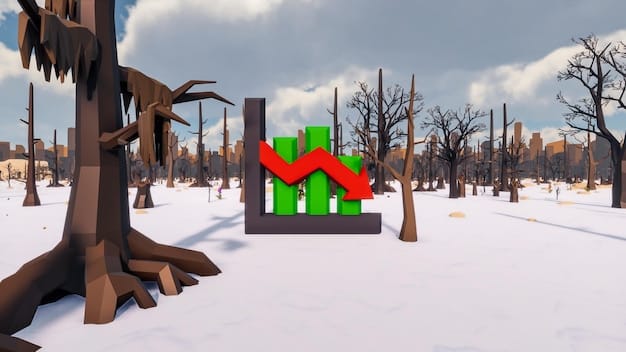Pay Off Debt Faster: Top 5 Personal Finance Strategies

Paying off debt faster can be achieved through strategies like creating a budget, prioritizing high-interest debts, considering debt consolidation, increasing income, and automating payments, enabling you to regain financial control and achieve long-term financial stability.
Feeling overwhelmed by debt? You’re not alone. The good news is that with the right approach, you can learn how to pay off debt faster: 5 proven personal finance strategies are available to help you regain control of your finances and achieve financial freedom. Let’s explore these strategies together.
Understand Your Debt Landscape
Before diving into strategies, it’s crucial to understand exactly what you owe. This involves taking stock of all your debts, from credit cards and student loans to mortgages and personal loans. Knowing the details is the first step toward a strategic payoff plan.
List All Your Debts
Start by creating a comprehensive list of every debt you have. Include the name of the lender, the type of debt (e.g., credit card, student loan), the outstanding balance, the interest rate, and the minimum monthly payment. This list will serve as your debt repayment roadmap.
Calculate Your Debt-to-Income Ratio
Understanding your debt-to-income (DTI) ratio offers insights into how much of your income goes toward debt repayment. Calculate your DTI by dividing your total monthly debt payments by your gross monthly income. A high DTI indicates that a significant portion of your income is allocated to debt, which can be a red flag.
- Track spending: Use budgeting apps or spreadsheets to monitor where your money goes.
- Categorize expenses: Divide your spending into categories like housing, transportation, and entertainment.
- Identify leaks: Look for areas where you can cut back, such as dining out or subscription services.

By understanding your debt landscape and meticulously tracking your spending, you’ll gain valuable insights into your financial situation, setting the stage for effective debt repayment strategies.
Create a Realistic Budget
Budgeting is the cornerstone of any successful debt payoff plan. A well-crafted budget allows you to track your income and expenses, identify areas where you can save money, and allocate funds toward debt repayment. It provides a clear picture of your financial health.
Track Your Income and Expenses
Start by tracking every dollar that comes in and goes out. Use budgeting apps, spreadsheets, or even a simple notebook to record your income and expenses. Be as detailed as possible, categorizing your expenses to identify spending patterns.
Identify Areas to Cut Back
Once you have a clear picture of your spending habits, look for areas where you can cut back. Common areas include dining out, entertainment, and subscription services. Even small reductions in these areas can add up to significant savings over time.
- Automate payments: Set up automatic payments to avoid late fees and ensure on-time payments.
- Use cash or debit cards: Avoid overspending by using cash or debit cards instead of credit cards.
- Plan your meals: Reduce dining out expenses by planning your meals and cooking at home.
Creating a realistic budget gives you control over your finances and empowers you to allocate more money towards tackling your debts, leading to faster and more effective debt repayment.
Prioritize High-Interest Debts
When you have multiple debts, it’s essential to prioritize those with the highest interest rates. High-interest debts, such as credit card balances, can quickly accumulate interest charges, making it harder to pay them off. Focusing on these debts first can save you money in the long run.
Avalanche Method
The avalanche method involves listing your debts from the highest interest rate to the lowest. Focus on paying off the debt with the highest interest rate first, while making minimum payments on the others. Once the high-interest debt is paid off, move on to the next highest.
Snowball Method
The snowball method involves listing your debts from the smallest balance to the largest. Focus on paying off the debt with the smallest balance first, regardless of the interest rate. Once the small debt is paid off, move on to the next smallest. This method provides quick wins and momentum.
- Negotiate lower rates: Contact your creditors and see if they are willing to lower your interest rates.
- Transfer balances: Consider transferring high-interest balances to a lower-interest credit card.
- Debt consolidation: Consolidate multiple debts into a single loan with a lower interest rate.
Focusing on high-interest debts using methods like the avalanche or snowball can save you money on interest and accelerate your journey towards becoming debt-free, reducing the overall cost of your debts.

Consider Debt Consolidation
Debt consolidation involves combining multiple debts into a single loan with a fixed interest rate and a fixed monthly payment. It can simplify your finances by reducing the number of bills you have to manage and potentially lower your interest rate, making it easier to pay off your debt.
Balance Transfer Credit Cards
Balance transfer credit cards allow you to transfer high-interest balances from multiple credit cards to a single card with a lower interest rate, often 0% for a limited time. This can save you money on interest charges and help you pay off your debt faster.
Personal Loans
Personal loans are unsecured loans that can be used to consolidate various types of debt, such as credit card balances, student loans, and medical bills. They typically offer fixed interest rates and fixed monthly payments, making budgeting easier.
- Research options: Compare different consolidation options to find the best fit for your needs.
- Check fees: Be aware of any fees associated with debt consolidation, such as origination fees or balance transfer fees.
- Read the fine print: Understand the terms and conditions of the consolidation loan or balance transfer offer.
Debt consolidation offers a streamlined approach to managing your debts, potentially saving money on interest and simplifying repayment. Careful research and understanding the terms are crucial before making a decision.
Increase Your Income
While budgeting and debt management are essential, increasing your income can provide an additional boost to your debt payoff efforts. Having more money coming in allows you to allocate more funds towards debt repayment, accelerating the process and helping you get out of debt faster.
Side Hustles
Consider starting a side hustle to generate extra income. This could involve freelancing, driving for a ride-sharing service, or selling products online. The additional income can be used specifically for debt repayment.
Negotiate a Raise
If you’ve been performing well at your job, consider negotiating a raise with your employer. Research industry salary standards and present a case for why you deserve a higher salary. Any additional income can be put towards debt reduction.
- Sell unused items: Declutter your home and sell items you no longer need or use.
- Rent out a spare room: If you have a spare room, consider renting it out to a tenant or through a short-term rental service.
- Monetize hobbies: Turn your hobbies into income-generating opportunities, such as selling handmade crafts or offering photography services.
Boosting your income through side hustles, negotiating a raise, or monetizing skills can significantly accelerate debt repayment. Increasing your income offers flexibility and speeds up achieving financial freedom.
Automate Your Payments
Automating your debt payments is a simple yet effective way to ensure that you never miss a payment and avoid late fees. Setting up automatic payments also eliminates the temptation to skip payments, allowing you to stay on track with your debt payoff plan. Automating payments ensures consistency and helps you in staying committed to the debt repayment process.
Set Up Automatic Transfers
Work with your bank or lender to set up automatic payments from your checking account to your debt accounts. This ensures that your payments are made on time, every time, without you having to manually initiate them.
Use Payment Scheduling Tools
Explore payment scheduling tools and apps that allow you to schedule and automate your debt payments. These tools often send reminders and notifications to help you stay organized and avoid missing payments.
- Review regularly: Periodically review your automated payments to ensure they are still accurate and aligned with your budget.
- Adjust as needed: As your income or expenses change, adjust your automated payment amounts accordingly.
- Monitor accounts: Keep an eye on your bank and debt accounts to ensure that payments are being processed correctly.
Automating your payments helps maintain consistency in your debt payoff plan, ensuring you stick to your commitment and avoid costly penalties, making it an essential component of successful debt repayment.
| Key Point | Brief Description |
|---|---|
| 📊 Budgeting | Track income & expenses to find savings opportunities. |
| 💰 High-Interest | Prioritize debts with highest interest rates for faster payoff. |
| 🤝 Consolidation | Combine multiple debts into one loan with lower rate. |
| 🚀 Extra Income | Increase earnings to allocate more funds to debt repayment. |
[FAQ]
▼
The first step is to understand your debt landscape by listing all your debts, including the lender, type of debt, outstanding balance, interest rate, and minimum monthly payment. This provides a clear picture.
▼
Budgeting helps you track income and expenses, identify areas to cut back, and allocate funds towards debt repayment. It gives you control over your finances and empowers you to tackle debt effectively.
▼
The avalanche method involves listing debts from the highest interest rate to the lowest and focusing on paying off the debt with the highest interest rate first, while making minimum payments on the others.
▼
Debt consolidation simplifies finances by combining multiple debts into a single loan with a fixed interest rate and payment. This can lower interest rates and make debt repayment more manageable.
▼
Increasing income provides an additional boost to your debt payoff efforts. Having more money coming in allows you to allocate more funds towards debt repayment, accelerating the process toward financial freedom.
Conclusion
Paying off debt faster requires a strategic approach, combining budgeting, prioritizing high-interest debts, considering debt consolidation, increasing income, and automating payments. By implementing these strategies and staying committed to your plan, you can regain financial control and achieve your goal of becoming debt-free.





